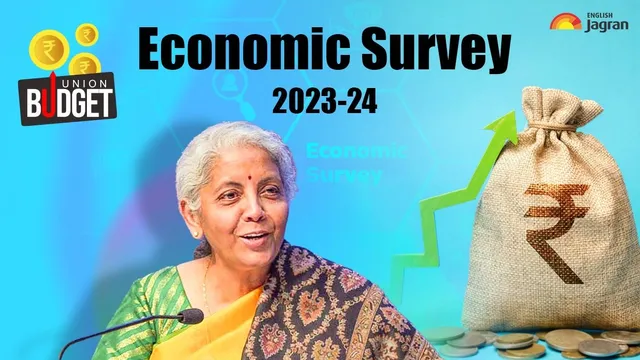- By Vivek Raj
- Mon, 22 Jul 2024 02:06 PM (IST)
- Source:JND
The Monsoon session of Parliament began today, and Finance Minister Nirmala Sitharaman tabled the Economic Survey 2023-24 in the Lok Sabha, describing the Indian economy as being on a "strong wicket and stable footing." Sitharaman will create history on Tuesday as the first Finance Minister to present seven consecutive Union budgets.
Here are the highlights of Economic Survey 2023-24:
GDP Growth Projection
The survey projects India’s real GDP growth to be between 6.5 per cent and 7 per cent for the fiscal year 2024-25. This estimate aligns with the International Monetary Fund’s forecast of 7 per cent growth. “The survey conservatively projects a real GDP growth of 6.5–7 per cent with risks evenly balanced, cognizant of the fact that market expectations are on the higher side.”
Inflation Trends
The Economic Survey provided insights into inflationary trends. Core inflation, driven by services inflation and a robust labor market in most Asian economies, remained persistent. Retail inflation declined to 5.4 per cent in FY24, down from 6.7 per cent in FY23.
This reduction was attributed to the effective management of global inflationary pressures, supply chain disruptions, and monsoon variability through administrative and monetary policy responses.
Capital Expenditure and Investment
The survey highlighted the government’s emphasis on capital expenditure and its positive impact on capital formation. Gross Fixed Capital Formation increased by 9 per cent in real terms during 2023-24. The report attributes this growth to the government's focus on infrastructure and sustained private investment.
Inequality
The Economic Survey noted that the 2022 State of Inequality in India report reveals that the top 1 per cent of earners receive 6-7 per cent of total incomes, while the top 10 per cent account for one-third. The survey emphasized that the government is addressing inequality through policies focused on job creation, formalizing the informal sector, and expanding the female labor force.
Impact of Artificial Intelligence
The survey highlighted the uncertainty surrounding artificial intelligence (AI) and its potential effects on employment across various skill levels. This issue was previously addressed in a mini-document published ahead of the Interim Budget.
Fuel Prices and Inflation
The survey reported a decline in the global energy price index in FY24 and detailed the Central Government's actions to reduce fuel prices. In August 2023, the price of domestic LPG cylinders was reduced by Rs 200, leading to deflation in LPG inflation. Similarly, in March 2024, the government lowered petrol and diesel prices by Rs 2 per liter, resulting in deflationary trends in retail fuel inflation.
Job Creation Needs
The survey highlighted the need to generate an average of 78.5 lakh jobs annually in the non-farm sector until 2030 to accommodate the growing workforce.
Rising Food Inflation
The Economic Survey noted that rising food inflation is driven by adverse weather conditions affecting the agriculture sector. Challenges such as extreme weather events, depleted reservoirs, and crop damage have impacted farm output and food prices. Food inflation rose from 6.6 per cent in FY23 to 7.5 per cent in FY24.

